History
BeGeistert originally started as a BeOS conference, playing an important part in its community. For example, developers and representatives of Be Europe and other important contributors attended the conference in the late 1990s. This history is reflected in the conference name, as the use of capitalization in the German word "begeistert" (meaning: "excited") alludes to Be Inc., the developer of the BeOS.
After the bankruptcy of Be Inc. caused the BeOS to be discontinued in the early 2000s, the conference was attended by representatives of the two projects deriving from the BeOS: ZETA, a closed source commercial initiative by yellowTAB based on the source code of an unreleased version of the BeOS, and the Haiku project, an initiative to create an open source operating system that is inspired by and compatible with the latest official release of the BeOS. After yellowTAB's insolvency in 2006, the conference's focus shifted entirely to Haiku. In 2007, feathers similar to those in the Haiku logo were added to the BeGeistert logo to reflect this shift.
The conference is organized and partially funded by the Haiku Support Association e.V., formerly BeFAN e.V., [2] and also supported by Haiku, Inc. Between 2004 and 2006, Haiku, Inc. also organized an official annual Haiku conference in various places in the United States under the name "WalterCon", which was discontinued due to a "lack of community interest" for the 2007 conference. [3]
Editions
In 1998, BeGeistert started as a one-day event, but became a two-day conference since BeGeistert 004, [4] mostly taking place in April and October. As of 2013, the conference is held annually.
Between 2000 and 2008, some conference weekends included coding challenges, [5] which among others resulted in the first localizable version of OpenTracker. Since 2003, it is being organized in the City Youth Hostel in Düsseldorf's Oberkassel neighborhood, except during the youth hostel's reconstruction in 2006. Since 2008, nearly every edition of the conference was either preceded or followed by a coding event, later becoming the Haiku CodeSprint, lasting up to a week. [2]
Each edition of BeGeistert is identified by a three-digit number and a motto that often refers to the current events in the BeOS/Haiku world, such as moving on after the bankruptcy of Be, Inc., or the unveiling of a new (alpha) release of Haiku.
| Edition | Motto | Date | Location | Comments |
|---|
| BeGeistert 001 | – | December 12, 1998 | Düsseldorf | - |
| BeGeistert 002 | – | April 25, 1999 | - |
| BeGeistert 003 | "BeOS on Your Doorstep" | October 9, 1999 | Frankfurt | Collocated with the BeDC [6] |
| BeGeistert 004 | "Do It Yourself" | April 15–16, 2000 [4] | Düsseldorf-Eller | – |
| BeGeistert 005 | "Arena" | October 7–8, 2000 [5] | – |
| BeGeistert 006 | "Ghost in the Machine" | April 21–22, 2001 [4] | – |
| BeGeistert 007 | "License to Code" | October 19–21, 2001 | – |
| BeGeistert 008 | "The Road Ahead" | April 5–7, 2002 | – |
| BeGeistert 009 | "Step By Step" | October 19–20, 2002 | – |
| BeGeistert 010 | "Brave New World" | April 26–27, 2003 | Düsseldorf | – |
| BeGeistert 011 | "NeXTSteps" | October 18–19, 2003 | – |
| BeGeistert 012 | "Dirty Dozen" | April 17–18, 2004 | – |
| BeGeistert 013 | "(Un)Lucky numbers" | October 16–17, 2004 | – |
| BeGeistert 014 | "Dinner for one" | April 2–3, 2005 | – |
| BeGeistert 015 | "The 15th Commandment" | October 8–9, 2005 | – |
| BeGeistert 016 | "Ich bin ein Berliner" | May 20–21, 2006 | Berlin-Wannsee | – |
| BeGeistert 017 | "Marco Polo" | December 9–10, 2006 | Milan | – |
| BeGeistert 018 | "Phoenix" | January 12–13, 2008 | Düsseldorf | Coding event prior |
| BeGeistert 019 | "Alphaville" | October 11-12, 2008 | Coding event |
| BeGeistert 020 | "Twenty Things to Do Before…" | April 4–5, 2009 | Coding event afterwards |
| BeGeistert 021 | "21st Century OS" | October 17–18, 2009 | Coding event afterwards |
| BeGeistert 022 | "Return of the Cola-Coder" | April 10–11, 2010 | Coding event & tutorial day afterwards |
| BeGeistert 023 | "Prime Time" | October 23–24, 2010 | Coding event prior |
| BeGeistert 024 | "Black Bird" | October 29–30, 2011 | Coding event |
| BeGeistert 025 | "Silver" | March 30 – April 1, 2012 | No coding event |
| BeGeistert 026 | "Marathon" | November 3–4, 2012 | Coding event |
| BeGeistert 027 | "TBC (To Be Continued)" | September 14–15, 2013 | Coding event afterwards |
| BeGeistert 028 | "Full Metal Package" | October 25–26, 2014 |
| BeGeistert 029 | "To Be Announced..." | November 7–8, 2015 |
| BeGeistert 030 | – | October 29–30, 2016 |
| BeGeistert 031 | "The Dirty One" | November 1–4, 2018 | Hamburg | – |
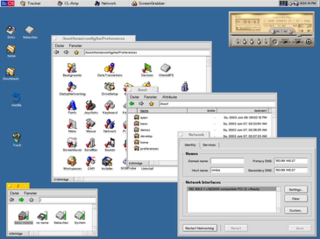
BeOS is an operating system for personal computers first developed by Be Inc. in 1990. It was first written to run on BeBox hardware.
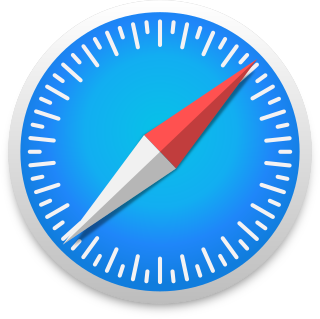
Safari is a web browser developed by Apple. It is built into Apple's operating systems, including macOS, iOS, and iPadOS, and uses Apple's open-source browser engine WebKit, which was derived from KHTML.
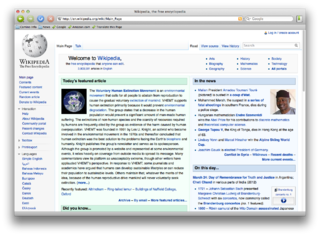
Camino is a discontinued free, open source, GUI-based Web browser based on Mozilla's Gecko layout engine and specifically designed for the OS X operating system. In place of an XUL-based user interface used by most Mozilla-based applications, Camino used Mac-native Cocoa APIs. On May 30, 2013, the Camino Project announced that the browser is no longer being developed.

Mozilla Firefox, or simply Firefox, is a free and open-source web browser developed by the Mozilla Foundation and its subsidiary, the Mozilla Corporation. It uses the Gecko rendering engine to display web pages, which implements current and anticipated web standards. In November 2017, Firefox began incorporating new technology under the code name "Quantum" to promote parallelism and a more intuitive user interface. Firefox is available for Windows 7 or later versions, macOS, and Linux. Its unofficial ports are available for various Unix and Unix-like operating systems, including FreeBSD, OpenBSD, NetBSD, illumos, and Solaris Unix. It is also available for Android and iOS. However, as with all other iOS web browsers, the iOS version uses the WebKit layout engine instead of Gecko due to platform requirements. An optimized version is also available on the Amazon Fire TV as one of the two main browsers available with Amazon's Silk Browser.
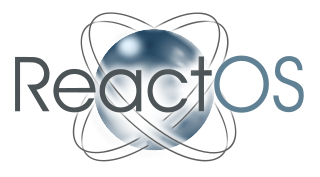
ReactOS is a free and open-source operating system for amd64/i686 personal computers intended to be binary-compatible with computer programs and device drivers developed for Windows Server 2003 and later versions of Microsoft Windows. ReactOS has been noted as a potential open-source drop-in replacement for Windows and for its information on undocumented Windows APIs.

Haiku is a free and open-source operating system capable of running applications written for the now-discontinued BeOS, which it is modeled after. Its development began in 2001, and the operating system became self-hosting in 2008. The first alpha release was made in September 2009, and the last alpha was released on November 2012; the first beta was released in September 2018, followed by beta 2 in June 2020, then beta 3 in July 2021. The fourth beta was released on December 23, 2022, still keeping BeOS 5 compatibility in its x86 32-bit images, with a greatly increased number of modern drivers, GTK3 apps and Wine port, as well as Xlib (X11) and Wayland compatibility layers.

Psi is a free instant messaging client for the XMPP protocol which uses the Qt toolkit. It runs on Linux, Windows, macOS and OS/2.
yellowTAB was a German software firm that produced an operating system called "yellowTAB ZETA". While the operating system was based on BeOS 5.1.0, the company never publicly confirmed that it has the BeOS source code or what their licensing agreement with BeOS's owners PalmSource was. The company went insolvent and ceased trading in 2006. Later, David Schlesinger, directory of Open Source technologies at ACCESS, Inc., which had meanwhile become the owner of the BeOS source code, stated that there had never been a license agreement covering yellowTAB's use of the source code and that ZETA was therefore an infringed copy.
magnussoft ZETA, earlier yellowTAB ZETA, was an operating system formerly developed by yellowTAB of Germany based on the Be Operating System developed by Be Inc.; because of yellowTAB's insolvency, ZETA was later being developed by an independent team of which little was known, and distributed by magnussoft. As of February 28, 2007 the current version of ZETA is 1.5. On March 28, 2007, magnussoft announced that it has discontinued funding the development of ZETA by March 16, because the sales figures had fallen far short of the company's expectations, so that the project was no longer economically viable. A few days later, the company also stopped the distribution of ZETA in reaction to allegations that ZETA constituted an illegal unlicensed derivative of the BeOS source code and binaries.

OpenTracker is the open-source version of the Tracker file manager for BeOS-compatible operating systems.

OpenSolaris is a discontinued open-source computer operating system based on Solaris and created by Sun Microsystems. It was also, perhaps confusingly, the name of a project initiated by Sun to build a developer and user community around the eponymous operating system software.

NetSurf is an open-source web browser which uses its own layout engine. Its design goal is to be lightweight and portable. NetSurf provides features including tabbed browsing, bookmarks and page thumbnailing.
BeOS R5 is the final version of BeOS from Be Inc. It was released in March 2000, and came in two varieties: Professional and Personal.

Google Chrome is a cross-platform web browser developed by Google. It was first released in 2008 for Microsoft Windows, built with free software components from Apple WebKit and Mozilla Firefox. Versions were later released for Linux, macOS, iOS, and also for Android, where it is the default browser. The browser is also the main component of ChromeOS, where it serves as the platform for web applications.

Arora is a discontinued free and open-source web browser developed by Benjamin C. Meyer. It was available for Linux, Mac OS X, Windows, FreeBSD, OS/2, Haiku, Genode, and any other operating system supported by the Qt toolkit. The browser's features included tabbed browsing, bookmarks, browsing history, smart location bar, OpenSearch, session management, privacy mode, a download manager, WebInspector, and AdBlock.
The history of Haiku, a free, open-source operating system, began in 2001. As of January 2016, as refactoring FLOSS effort of BeOS named initially "OpenBeOS". It used open sourced code of a Tracker file browser and NewOS kernel.
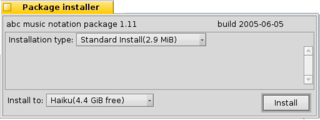
Haiku's Package Installer is a software installer for BeOS packages in PKG format. It provides an easy-to-use GUI that helps in fast package installation in Haiku. Haiku is a free and open-source operating system compatible with the now discontinued BeOS.

WebPositive is a web browser included with the Haiku operating system. It was created to replace the aging BeZillaBrowser with a WebKit-based browser.
Console Enterprises is an American technology company headquartered in Chico, California, that focuses on high-performance Android platform design. It is best known for its Console OS Kickstarter campaign, a project intended on developing a native Android distribution for the PC.










